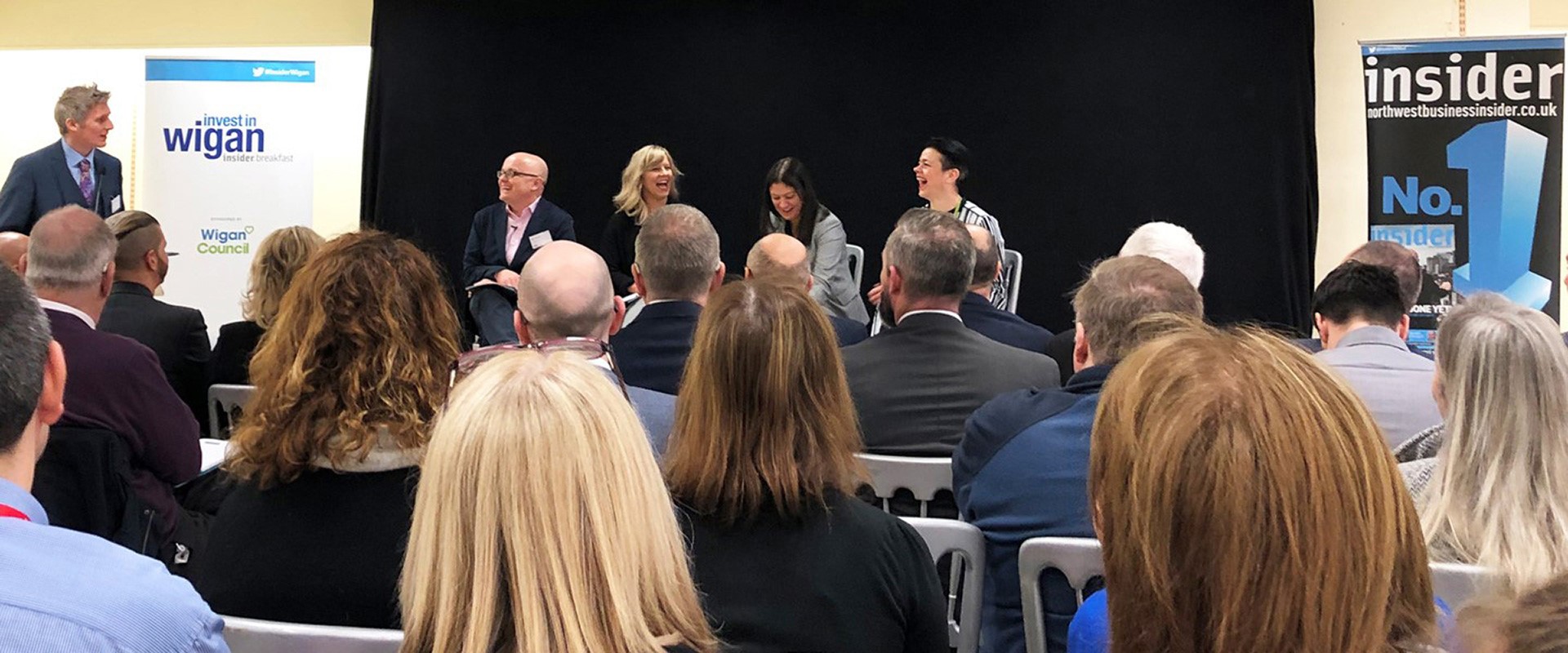Seeing delegates wandering through the eerily quiet Galleries Shopping centre to attend Wednesday’s Insider breakfast was a bit like a scene from The Waking Dead with zombies trudging around a disused mall. To be fair, most shopping centres are empty at 7.15AM but this one is pretty much always empty these days being virtually devoid of tenants. The event was focused on the Council’s plans to regenerate the town centre and was appropriately held in the former Peacocks shop unit, long since vacated by yet another bankrupt retailer, and was the perfect place to illustrate the problem.
Insider North West’s Editor Simon Keegan presented the event which featured 2 Q&A panels.The first comprised of Steve Connor of Creative Concern, Dr Maria Stukoff of Salford University, Lisa Nandy Wigan’s MP and Becca Heron Director of Economy at Wigan Council.
Following the obligatory light hearted intro from Councillor David Molyneux beseeching us to take advantage of the free parking at weekends to come shopping, Simon started by asking Steve to outline the strategy they’ve developed for the town, a copy of which was handily placed on every seat. Their strategy acknowledges the spread of urbanisation and proposes that towns are the new cities as places to live and work. Key to this, for Wigan, is its connectivity to the motorway and rail networks especially when the much anticipated HS2 arrives to hopefully make the town the gateway to the North. The strategy also positions Wigan as a place of innovation, referencing its industrial heritage but also its aspirations to become a centre for digital, and that Wigan is a place for businesses to grow. The document illustrates this with some case studies of local small businesses who are growing. Somewhat disappointingly the digital agency they chose to feature, whilst it has offices in Wigan, is actually registered to an address in Leeds and is mostly owned by Yorkshiremen. Heigh ho.
Becca Heron then elaborated on this with a particular focus on the town centre and the massive challenge this represents for the Council all too palpably illustrated by the vast empty mall we could see through the streaky plate glass windows that were once full of mannequins. The Council built the Galleries back in the 80s and sold it for around £90M they’ve recently bought it back for just £9M. This sounds like a great bit of business, however the costs of redeveloping and repurposing the property, which takes up around a quarter of the town centre - without knocking it down - is no small challenge. Becca outlined ideas for mixed uses including leisure, office space (of which there’s always been a shortage), incubator hubs and residential as well as retail noting that the decline of high street shopping is a national phenomena due largely to the shift to online.
Becca was followed by Wigan’s MP, Lisa Nandy, who seemed to be revelling in the opportunity to think about something other than Brexit. She echoed much of Becca’s sentiments but was keen to express her constituent’s views and distance herself a little from the Council’s pointing out that she was happy to challenge them as necessary. That said, she endorsed the Council as a forward thinking and ambitious one. Lisa reminded us that, despite all the typical issues Wigan town centre faces, it does have some advantages in that Wiganers are fundamentally loyal and prefer to stay local, she said her constituents constantly tell her that they want a vibrant town that offers a great experience as well as shopping.
By far the most challenging panellist was Dr Maria from Salford Uni, a typically confident Aussie who started by apologising in advance for a predilection to swear. She cut straight to the point by asking where all the young people from Generation Z [now renamed generation W for Wigan] were in the audience which had an average age of well over 40. Fair point given that the strategy is written as a report of what the town will be in 2030 and it’s this generation that will build it. Then she set about challenging the very starting point of the town centre strategy arguing that the focus on retail was misplaced, that the Council should be thinking about using the space for wellness, mindfulness, fitness, collaboration and that free parking on the weekend to try and get people to go to shops they don’t use any more is fairly pointless. (I see her point but I do have a lot of sympathy here in that the acres of empty shop space is the immediate problem the Council are trying to address). She explained that what generation W want is very different, and that the future is much more about digital both in work and leisure including egaming which is even to become an Olympic sport. She talked about her work at Salford Uni and the Maker Space program in which they work with primary school aged kids right through school age, onto under and post graduates teaching them the skills needed for 2030 and that this will create a very different demographic with different wants and needs and it’s these that the Council need to factor in to its plans.
The second panel was cut short as the first one overran, but included Rebecca Davenport from The Old Courts, Peter Rimmer chair of the Wigan Forward Board and bd2’s very own Bryony Wright. Rebecca started by summarising the work that The Old Courts do as a not for profit multi-arts centre aiming to bring into the borough innovative art, theatre, music, comedy, dance and spoken word events. The impact they have had on this scene has been very successful which was further emphasised by their announcement that in conjunction with Step Places, they will be the operator and main tenant of the soon to be regenerated Wigan Pier Site. This transformation will hopefully be the catalyst for wider development in the area.
Bryony spoke about one of the main challenges bd2 face as a business around talent and skills; because the digital sector is so fast moving, academia struggles to keep pace and teach new skills so that when students finish their education they are often behind the curve. As a business, bd2 is keen to encourage local recruitment, investing in apprenticeships, placements and being active in local education institutions to inform students about the careers opportunities in the digital sector. We echo Dr Maria’s comments about engaging generation W at an early stage to encourage the passion and enthusiasm that the sector needs from its future workforce, and would love to see a program like Maker Space in Wigan. Bryony concluded that the regeneration plans of the council were a positive move forward for the borough and could help not only to retain, but to attract new talent into the area helping to ease the challenges around digital recruitment.
Peter Rimmer, Chief Exec of Fleet Dynamic, talked about their past difficulties finding office space in Wigan leading them to relocate Head Office to St Helens (of all places!), and as chair of the Wigan Forward Board their aim, working in conjunction with the council, to drive forward sustainable economic growth in the borough.
As someone who has worked in digital most of their career (reluctantly admitting that’s for the last 25 years or so) launching a digital agency in 1998 which is very proudly based in Wigan, works with local businesses and supports local causes, it’s great to see the Council recognise the changing business environment and the ecosystem needed to support this. My own experiences have often felt like an uphill struggle. From trying to find office space, failing, and ultimately buying a residential property and converting it into an office, to the skills gap and trying to recruit locally. I’ve always felt there’s been a focus on the volume not quality of jobs at Council level and have experienced a lack of support and recognition of the value of digital and creative sector to the local economy. I think this is because of the lack of visibility and voice of the many micro businesses that it’s made up of compared to the giant sheds of the big logistics business or retailers such as the old JJB Sports, who were big employers back in their hey day. Many of these jobs are zero hours contracts for pickers and packers and these businesses do need an infrastructure of skills to support them - we used to do a lot of digital work for JJB back in the day for example. So it’s great to see a real shift in focus to start to address these issues and in Becca Heron, someone at Director level who really ‘gets it’.
As someone who lives and works in Wigan, I fully appreciate that the town faces some massive issues and that these aren’t going to be resolved overnight, but I am enthused by the ambitious and confident strategy the Council has published and by the regeneration plan. I’m hopeful too that something we’ve been in dialogue with the council for the last 3 years, will form part of this and provide a virtual platform to complement the new physical spaces they’re developing - an online portal which would connect the potential generation W tenants of the incubator hubs with the local businesses that need their skills.
Insider Business Breakfast review
By Will Bentley on

